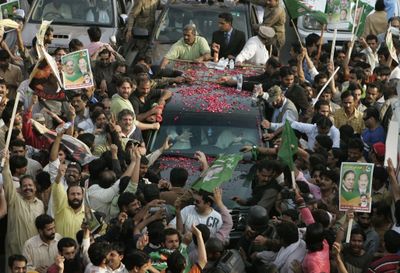Pakistan reinstates judges
Move could ease tensions in nuclear-armed nation

LAHORE, Pakistan – Unable to crush street protests Sunday that spilled out of this city and threatened to reach the capital, the Pakistani government announced early this morning that it would restore the former chief justice of the Supreme Court and a group of other deposed judges in a major capitulation to opponents.
The move reflected the weakening position of President Asif Ali Zardari, a key U.S. ally. Zardari had resisted bringing back former chief justice Iftikhar Mohammed Chaudhry for months, but he faced mounting pressure from a broad coalition of opponents who demanded the reinstatement of Pakistan’s independent judiciary and threatened to march on the capital, Islamabad.
The decision marked an extraordinary victory for Pakistan’s legal community, which has been agitating peacefully for the judges’ reinstatement for the past two years, and for Zardari’s major political rival, former Prime Minister Nawaz Sharif. He defied house arrest Sunday to lead supporters in a boisterous protest caravan along the 150-mile route to Islamabad.
As word spread early today that Prime Minister Yousaf Raza Gillani would announce the judges’ restoration to office, Pakistani television stations showed jubilant crowds gathering around Chaudhry’s house in Islamabad. Celebrations also erupted in the Sharif-led caravan, which was traveling through the night from Lahore. The prime minister made the official announcement at dawn today in an address to the nation, saying Chaudhry would be reinstated March 21, and that lawyers and activists arrested in the past week would be freed.
Pakistan, a nuclear-armed Muslim nation of 172 million, faces a raging Islamist insurgency and a deepening economic crisis. The growing confrontation between Zardari and a coalition of primarily secular opponents has alarmed Washington and raised the prospect of a possible army coup, just one year after Pakistan emerged from a decade of military rule.
A spokesman for Sharif’s party, the Pakistan Muslim League-N, had said that he expected an official pardon of Chaudhry and the other judges, in accordance with an agreement signed by Zardari and Sharif last year.
Muslim League officials had suggested that once the decision was officially announced, they would call off their “long march” to the capital today and cancel a long-planned protest. The government had sealed off Islamabad with shipping containers and other barricades late Saturday in an attempt to prevent the marchers from entering the federal government district. But as rumors of Chaudhry’s restoration spread, many police barricades were withdrawn from the Grand Trunk Road.
Chaudhry and the other judges were fired in 2007 by Pakistan’s former military ruler, Pervez Musharraf, because they refused to take an oath under his amended constitution.
Zardari had publicly insisted that the judges could not be restored until Pakistan’s parliament had a chance to make broader changes in the constitution. But many Pakistanis and foreign observers believed the president reneged on his pledge to restore them because he feared that the independent-minded Chaudhry would reopen old corruption cases against him and might also overturn many of his actions as president.
Zardari’s turnabout came after thousands of demonstrators poured into the streets of Lahore on Sunday, throwing rocks at police and cheering wildly.